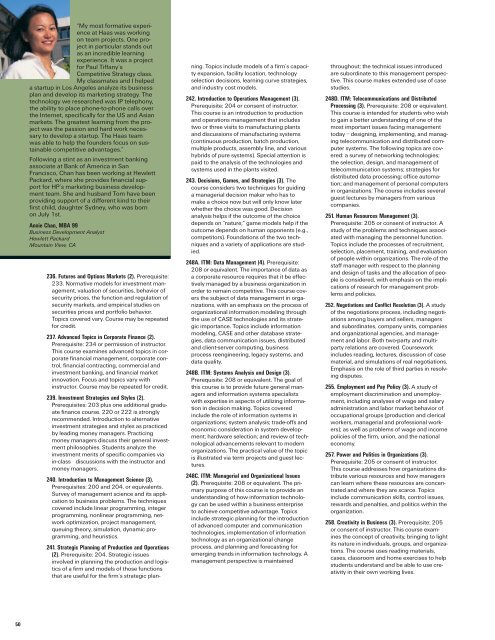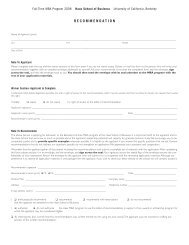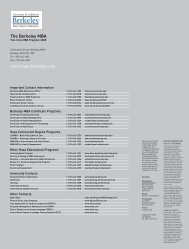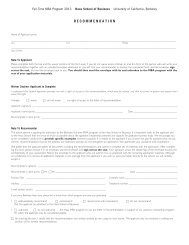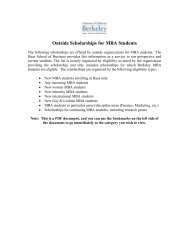TheBerkeleyMBA - Full-time MBA Program, Haas School of ...
TheBerkeleyMBA - Full-time MBA Program, Haas School of ...
TheBerkeleyMBA - Full-time MBA Program, Haas School of ...
Create successful ePaper yourself
Turn your PDF publications into a flip-book with our unique Google optimized e-Paper software.
“My most formative experience<br />
at <strong>Haas</strong> was working<br />
on team projects. One project<br />
in particular stands out<br />
as an incredible learning<br />
experience. It was a project<br />
for Paul Tiffany’s<br />
Competitive Strategy class.<br />
My classmates and I helped<br />
a startup in Los Angeles analyze its business<br />
plan and develop its marketing strategy. The<br />
technology we researched was IP telephony,<br />
the ability to place phone-to-phone calls over<br />
the Internet, specifically for the US and Asian<br />
markets. The greatest learning from the project<br />
was the passion and hard work necessary<br />
to develop a startup. The <strong>Haas</strong> team<br />
was able to help the founders focus on sustainable<br />
competitive advantages.”<br />
Following a stint as an investment banking<br />
associate at Bank <strong>of</strong> America in San<br />
Francisco, Chan has been working at Hewlett<br />
Packard, where she provides financial support<br />
for HP’s marketing business development<br />
team. She and husband Tom have been<br />
providing support <strong>of</strong> a different kind to their<br />
first child, daughter Sydney, who was born<br />
on July 1st.<br />
Annie Chan, <strong>MBA</strong> 99<br />
Business Development Analyst<br />
Hewlett Packard<br />
Mountain View, CA<br />
236. Futures and Options Markets (2). Prerequisite:<br />
233. Normative models for investment management,<br />
valuation <strong>of</strong> securities, behavior <strong>of</strong><br />
security prices, the function and regulation <strong>of</strong><br />
security markets, and empirical studies on<br />
securities prices and portfolio behavior.<br />
Topics covered vary. Course may be repeated<br />
for credit.<br />
237. Advanced Topics in Corporate Finance (2).<br />
Prerequisite: 234 or permission <strong>of</strong> instructor.<br />
This course examines advanced topics in corporate<br />
financial management, corporate control,<br />
financial contracting, commercial and<br />
investment banking, and financial market<br />
innovation. Focus and topics vary with<br />
instructor. Course may be repeated for credit.<br />
239. Investment Strategies and Styles (2).<br />
Prerequisites: 203 plus one additional graduate<br />
finance course. 220 or 222 is strongly<br />
recommended. Introduction to alternative<br />
investment strategies and styles as practiced<br />
by leading money managers. Practicing<br />
money managers discuss their general investment<br />
philosophies. Students analyze the<br />
investment merits <strong>of</strong> specific companies via<br />
in-class discussions with the instructor and<br />
money managers.<br />
240. Introduction to Management Science (3).<br />
Prerequisites: 200 and 204, or equivalents.<br />
Survey <strong>of</strong> management science and its application<br />
to business problems. The techniques<br />
covered include linear programming, integer<br />
programming, nonlinear programming, network<br />
optimization, project management,<br />
queuing theory, simulation, dynamic programming,<br />
and heuristics.<br />
241. Strategic Planning <strong>of</strong> Production and Operations<br />
(2). Prerequisite: 204. Strategic issues<br />
involved in planning the production and logistics<br />
<strong>of</strong> a firm and models <strong>of</strong> those functions<br />
that are useful for the firm’s strategic planning.<br />
Topics include models <strong>of</strong> a firm’s capacity<br />
expansion, facility location, technology<br />
selection decisions, learning curve strategies,<br />
and industry cost models.<br />
242. Introduction to Operations Management (3).<br />
Prerequisite: 204 or consent <strong>of</strong> instructor.<br />
This course is an introduction to production<br />
and operations management that includes<br />
two or three visits to manufacturing plants<br />
and discussions <strong>of</strong> manufacturing systems<br />
(continuous production, batch production,<br />
multiple products, assembly line, and various<br />
hybrids <strong>of</strong> pure systems). Special attention is<br />
paid to the analysis <strong>of</strong> the technologies and<br />
systems used in the plants visited.<br />
243. Decisions, Games, and Strategies (3). The<br />
course considers two techniques for guiding<br />
a managerial decision maker who has to<br />
make a choice now but will only know later<br />
whether the choice was good. Decision<br />
analysis helps if the outcome <strong>of</strong> the choice<br />
depends on “nature;” game models help if the<br />
outcome depends on human opponents (e.g.,<br />
competitors). Foundations <strong>of</strong> the two techniques<br />
and a variety <strong>of</strong> applications are studied.<br />
248A. ITM: Data Management (4). Prerequisite:<br />
208 or equivalent. The importance <strong>of</strong> data as<br />
a corporate resource requires that it be effectively<br />
managed by a business organization in<br />
order to remain competitive. This course covers<br />
the subject <strong>of</strong> data management in organizations,<br />
with an emphasis on the process <strong>of</strong><br />
organizational information modeling through<br />
the use <strong>of</strong> CASE technologies and its strategic<br />
importance. Topics include information<br />
modeling, CASE and other database strategies,<br />
data communication issues, distributed<br />
and client-server computing, business<br />
process reengineering, legacy systems, and<br />
data quality.<br />
248B. ITM: Systems Analysis and Design (3).<br />
Prerequisite: 208 or equivalent. The goal <strong>of</strong><br />
this course is to provide future general managers<br />
and information systems specialists<br />
with expertise in aspects <strong>of</strong> utilizing information<br />
in decision making. Topics covered<br />
include the role <strong>of</strong> information systems in<br />
organizations; system analysis; trade-<strong>of</strong>fs and<br />
economic consideration in system development;<br />
hardware selection; and review <strong>of</strong> technological<br />
advancements relevant to modern<br />
organizations. The practical value <strong>of</strong> the topic<br />
is illustrated via term projects and guest lectures.<br />
248C. ITM: Managerial and Organizational Issues<br />
(2). Prerequisite: 208 or equivalent. The primary<br />
purpose <strong>of</strong> this course is to provide an<br />
understanding <strong>of</strong> how information technology<br />
can be used within a business enterprise<br />
to achieve competitive advantage. Topics<br />
include strategic planning for the introduction<br />
<strong>of</strong> advanced computer and communication<br />
technologies, implementation <strong>of</strong> information<br />
technology as an organizational change<br />
process, and planning and forecasting for<br />
emerging trends in information technology. A<br />
management perspective is maintained<br />
throughout; the technical issues introduced<br />
are subordinate to this management perspective.<br />
This course makes extended use <strong>of</strong> case<br />
studies.<br />
248D. ITM: Telecommunications and Distributed<br />
Processing (3). Prerequisite: 208 or equivalent.<br />
This course is intended for students who wish<br />
to gain a better understanding <strong>of</strong> one <strong>of</strong> the<br />
most important issues facing management<br />
today – designing, implementing, and managing<br />
telecommunication and distributed computer<br />
systems. The following topics are covered:<br />
a survey <strong>of</strong> networking technologies;<br />
the selection, design, and management <strong>of</strong><br />
telecommunication systems; strategies for<br />
distributed data processing; <strong>of</strong>fice automation;<br />
and management <strong>of</strong> personal computers<br />
in organizations. The course includes several<br />
guest lectures by managers from various<br />
companies.<br />
251. Human Resources Management (3).<br />
Prerequisite: 205 or consent <strong>of</strong> instructor. A<br />
study <strong>of</strong> the problems and techniques associated<br />
with managing the personnel function.<br />
Topics include the processes <strong>of</strong> recruitment,<br />
selection, placement, training, and evaluation<br />
<strong>of</strong> people within organizations. The role <strong>of</strong> the<br />
staff manager with respect to the planning<br />
and design <strong>of</strong> tasks and the allocation <strong>of</strong> people<br />
is considered, with emphasis on the implications<br />
<strong>of</strong> research for management problems<br />
and policies.<br />
252. Negotiations and Conflict Resolution (3). A study<br />
<strong>of</strong> the negotiations process, including negotiations<br />
among buyers and sellers, managers<br />
and subordinates, company units, companies<br />
and organizational agencies, and management<br />
and labor. Both two-party and multiparty<br />
relations are covered. Coursework<br />
includes reading, lectures, discussion <strong>of</strong> case<br />
material, and simulations <strong>of</strong> real negotiations.<br />
Emphasis on the role <strong>of</strong> third parties in resolving<br />
disputes.<br />
255. Employment and Pay Policy (3). A study <strong>of</strong><br />
employment discrimination and unemployment,<br />
including analyses <strong>of</strong> wage and salary<br />
administration and labor market behavior <strong>of</strong><br />
occupational groups (production and clerical<br />
workers, managerial and pr<strong>of</strong>essional workers);<br />
as well as problems <strong>of</strong> wage and income<br />
policies <strong>of</strong> the firm, union, and the national<br />
economy.<br />
257. Power and Politics in Organizations (3).<br />
Prerequisite: 205 or consent <strong>of</strong> instructor.<br />
This course addresses how organizations distribute<br />
various resources and how managers<br />
can learn where these resources are concentrated<br />
and where they are scarce. Topics<br />
include communication skills, control issues,<br />
rewards and penalties, and politics within the<br />
organization.<br />
258. Creativity in Business (3). Prerequisite: 205<br />
or consent <strong>of</strong> instructor. This course examines<br />
the concept <strong>of</strong> creativity, bringing to light<br />
its nature in individuals, groups, and organizations.<br />
The course uses reading materials,<br />
cases, classroom and home exercises to help<br />
students understand and be able to use creativity<br />
in their own working lives.<br />
50


